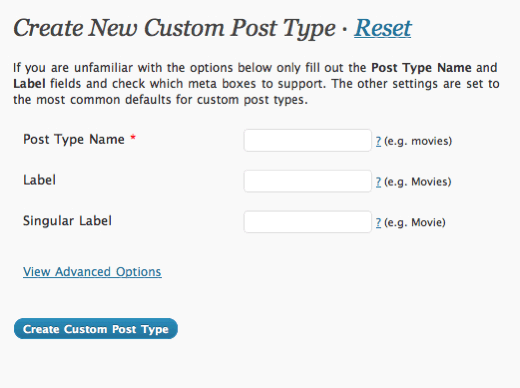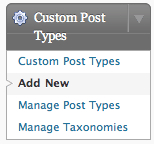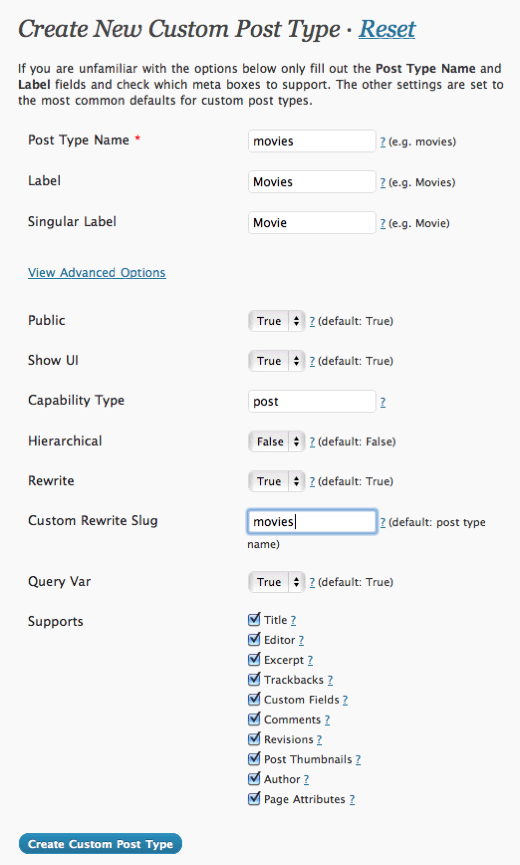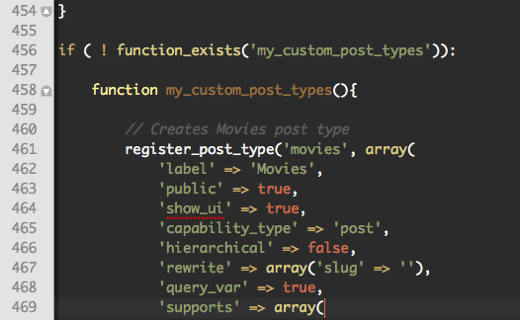How to use custom post types in WordPress 3.0
Apr 20, 2025 am 06:33 AMSince version 2.9, WordPress has introduced the ability to use custom post types. Now, in version 3.0, you can choose to create a panel for your custom post type, taking things a step further. In this tutorial, we will show you how to implement custom post types in your site into your WordPress site.
Create a custom post type – use plugins
Starting with version 3.0, WordPress does not have any built-in UI (user interface) to create custom post types. We can only use two options to create custom post types: plugins or hardcode them into the theme's functions.php file. First, let's see how to use plugins to create custom post types.
Custom post type UI

Custom Post Type UI is a plugin developed by Brad Williams from WebDevStudios, which allows you to easily create custom post types and taxonomy. One of the coolest features of this plugin is that it generates a code to create a custom post type so you can paste it into the functions.php file of the theme. One of the quirks of this plugin is the inability to share taxonomy among all post_types.

Click Add New Content from the Custom Post Type UI panel.

Next, you will see several options that need to be filled in. "Post Type Name" is the name of all posts used by WordPress to query such post_type. Tags will appear on the sidebar of the dashboard, just like the regular Publish menu. If you expand View Advanced Options, you will see more options that can be configured. Most are self-explanatory, such as "public" and "display UI". The first one is set to true to allow the display of the custom post type menu on the sidebar, and the other is set to true to generate the menu panel.
"Rewrite" allows custom post types to use SEO-friendly WordPress URLs (permanent links). "Custom Rewrite Slug" can be set to whatever you like. WordPress will use this slug to generate a permalink. So if we have a custom rewrite segment of example.com with "movies", your custom post type permalink will look like example.com/movies
WordPress's "Query Var" feature allows you to query posts for custom post types. So, if we use the example given earlier, to access a post titled My First Movie Post (written under Movies post_type), we can enter example.com/?movies=my-first-movie-post . So the query variable looks like this: ?posttypename
Finally, you can choose different features that custom post types support, such as thumbnails/featured images and excerpts.

Create a custom post type – use the Functions.php file

If you prefer to use custom post types without plugins, just add the following code to the theme's functions.php file:
// Creates Movies post typeregister_post_type('movies', array('label'=> 'Movies','public'=> true,'show_ui'=> true,'capability_type'=> 'post','hierarchical'=> false,'rewrite'=> array('slug'=> 'movies'),'query_var'=> true,'supports'=> array('title','editor','excerpt','trackbacks','custom-fields','comments','revisions','thumbnail','author','page-attributes',)) );
Depend on
Use it with one click in WordPress
Let's analyze the code.
register_post_type( $post_type, $args): This function accepts two parameters, $post_type or the name of the post type, and $args, parameter array.
Tag: The plural name specified for the post type displayed in the admin panel sidebar.
Public: True/False. Allows the management UI to populate such posts.
show_ui : True/False. Show or hide the default UI that manages this post type.
ability_type: Default: post The post type used to check the read, edit, and delete functions.
Layered: Whether the post type is layered.
Rewrite: True/False. Default: true If you enter the slug parameter, the slug name will be added to the front of the post.
query_var: true/false Set the post type name to the query variable.
Support: Default: Different support features allowed by title and author settings post type.
Visit WordPress Codex to learn more about register_post_type() .
Show custom post types
To display posts with custom post types, add the following code in the loop. Replace "name" with the name of your post type. Note: You do not have to add a custom post type in the index.php file. You can create a custom WordPress page and run the following query in Loop.
$query= newWP_Query( 'post_type=name');
Depend on
Use it with one click in WordPress
To display posts of multiple post types, change the above code to the following. Change the movie with your custom post type name.
$query= newWP_Query( array( 'post_type'=> array( 'post', 'movies')) );
Depend on
Use it with one click in WordPress
The above code will show all posts for the regular post type (post) and custom post type (movie).
The above is the detailed content of How to use custom post types in WordPress 3.0. For more information, please follow other related articles on the PHP Chinese website!

Hot AI Tools

Undress AI Tool
Undress images for free

Undresser.AI Undress
AI-powered app for creating realistic nude photos

AI Clothes Remover
Online AI tool for removing clothes from photos.

Clothoff.io
AI clothes remover

Video Face Swap
Swap faces in any video effortlessly with our completely free AI face swap tool!

Hot Article

Hot Tools

Notepad++7.3.1
Easy-to-use and free code editor

SublimeText3 Chinese version
Chinese version, very easy to use

Zend Studio 13.0.1
Powerful PHP integrated development environment

Dreamweaver CS6
Visual web development tools

SublimeText3 Mac version
God-level code editing software (SublimeText3)

Hot Topics
 How to avoid risks in the turmoil in the currency circle? The TOP3 stablecoin list is revealed
Jul 08, 2025 pm 07:27 PM
How to avoid risks in the turmoil in the currency circle? The TOP3 stablecoin list is revealed
Jul 08, 2025 pm 07:27 PM
Against the backdrop of violent fluctuations in the cryptocurrency market, investors' demand for asset preservation is becoming increasingly prominent. This article aims to answer how to effectively hedge risks in the turbulent currency circle. It will introduce in detail the concept of stablecoin, a core hedge tool, and provide a list of TOP3 stablecoins by analyzing the current highly recognized options in the market. The article will explain how to select and use these stablecoins according to their own needs, so as to better manage risks in an uncertain market environment.
 2025 Stablecoin Investment Tutorial How to Choose a Safe Stablecoin Platform
Jul 07, 2025 pm 09:09 PM
2025 Stablecoin Investment Tutorial How to Choose a Safe Stablecoin Platform
Jul 07, 2025 pm 09:09 PM
How do novice users choose a safe and reliable stablecoin platform? This article recommends the Top 10 stablecoin platforms in 2025, including Binance, OKX, Bybit, Gate.io, HTX, KuCoin, MEXC, Bitget, CoinEx and ProBit, and compares and analyzes them from dimensions such as security, stablecoin types, liquidity, user experience, fee structure and additional functions. The data comes from CoinGecko, DefiLlama and community evaluation. It is recommended that novices choose platforms that are highly compliant, easy to operate and support Chinese, such as KuCoin and CoinEx, and gradually build confidence through a small number of tests.
 Global stablecoin market value PK! Who is the gold substitute in the bear market
Jul 08, 2025 pm 07:24 PM
Global stablecoin market value PK! Who is the gold substitute in the bear market
Jul 08, 2025 pm 07:24 PM
This article will discuss the world's mainstream stablecoins and analyze which stablecoins have the risk aversion attribute of "gold substitute" in the market downward cycle (bear market). We will explain how to judge and choose a relatively stable value storage tool in a bear market by comparing the market value, endorsement mechanism, transparency, and comprehensively combining common views on the Internet, and explain this analysis process.
 The popularity of the currency circle has returned, why do smart people have begun to quietly increase their positions? Look at the trend from the on-chain data and grasp the next round of wealth password!
Jul 09, 2025 pm 08:30 PM
The popularity of the currency circle has returned, why do smart people have begun to quietly increase their positions? Look at the trend from the on-chain data and grasp the next round of wealth password!
Jul 09, 2025 pm 08:30 PM
As the market conditions pick up, more and more smart investors have begun to quietly increase their positions in the currency circle. Many people are wondering what makes them take decisively when most people wait and see? This article will analyze current trends through on-chain data to help readers understand the logic of smart funds, so as to better grasp the next round of potential wealth growth opportunities.
 Review of the most complete historical price of Ethereum ETH 2010-2025 (the latest version in 2025)
Jul 07, 2025 pm 09:00 PM
Review of the most complete historical price of Ethereum ETH 2010-2025 (the latest version in 2025)
Jul 07, 2025 pm 09:00 PM
Ethereum price has gone through several critical stages, from $0.70 in 2015 to $3,050 in 2025. 1) From 2015 to 2016, ETH rose from $0.70 to $20.64 in mid-2016; 2) from 2017 to 2018, driven by the ICO boom, reached $1,417 in early 2018, and then fell to $80 due to regulatory concerns; 3) from 2019 to 2020, and rose to $737 under DeFi; 4) from 2021, hit a new high of $4,864, and then fell to $1,200-2,000 due to PoS transformation; 5) from 2023 to 2024 to about $3,000
 Virtual Currency Stable Coins Ranking Which is the 'safe haven' in the currency circle
Jul 08, 2025 pm 07:30 PM
Virtual Currency Stable Coins Ranking Which is the 'safe haven' in the currency circle
Jul 08, 2025 pm 07:30 PM
This article will introduce several mainstream stablecoins and explain in depth how to evaluate the security of a stablecoin from multiple dimensions such as transparency and compliance, so as to help you understand which stablecoins are generally considered relatively reliable choices in the market, and learn how to judge their "hazard-haven" attributes on your own.
 Bitcoin breaks new highs, Dogecoin rebounds strongly, will Ethereum keep up with the pace
Jul 09, 2025 pm 08:24 PM
Bitcoin breaks new highs, Dogecoin rebounds strongly, will Ethereum keep up with the pace
Jul 09, 2025 pm 08:24 PM
Recently, Bitcoin hit a new high, Dogecoin ushered in a strong rebound and the market was hot. Next, we will analyze the market drivers and technical aspects to determine whether Ethereum still has opportunities to follow the rise.
 What is a stablecoin? What are the types of stable currencies? Is it related to US Treasury bonds?
Jul 07, 2025 pm 08:36 PM
What is a stablecoin? What are the types of stable currencies? Is it related to US Treasury bonds?
Jul 07, 2025 pm 08:36 PM
Stable coins are digital currencies that maintain stable value by anchoring specific assets. They are mainly divided into three categories: fiat currency collateral, crypto asset collateral and algorithmic. Among them, fiat currency collateral such as USDT and USDC are widely used, and their reserves are often invested in US Treasury bonds, forming a close connection with the traditional financial system.






